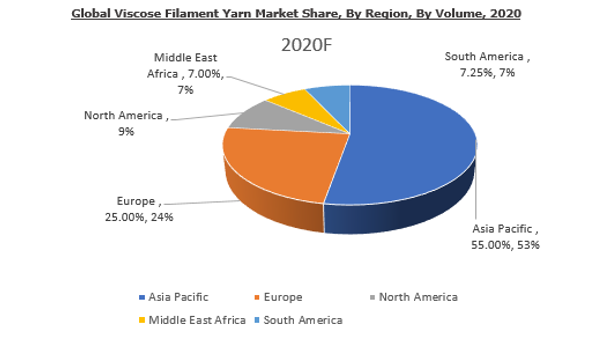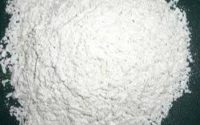Viscose Filament Yarn (VFY) – A Versatile Fibre for Textile Industry
As the demand for inexpensive, silky and luxury fabrics is increasing, there is an expected surge in the production of Viscose Filament Yarn (VFY), which will boost the VFY market worldwide in the upcoming years. Growing demand for sustainable, environmentally friendly and less toxic products from consumers is likely to bolster the market of VFY from major end-user industries such as clothing and home textiles. Due to the ability of VFY to absorb liquid, be light and breathable, they are extensively used in the manufacturing of soft, silky and smooth fabrics that lasts for a longer period. VFY has the potential to become the future of textiles as it conveys luxe fabrics at much cheaper prices with high quality and the capability to blend with other fabrics such as cotton, polyester and others.
Get more information: https://www.chemanalyst.com/industry-report/viscose-filament-yarn-market-606
The demand for VFY from clothing, textiles, weaving & knitting, apparels, home furnishings and other sectors is likely to propel the growth of the global VFY market. The global VFY market has shown considerable growth in the historic period and is anticipated to achieve a healthy CAGR of 4.40% during the forecast period. VFY also known as Rayon Filament Yarn is a versatile natural fiber which is silky and soft in consistency. VFY possesses the capabilities such as drapability, flexibility, durability and glossy appearance which makes it an incredible choice for many factories to produce fabrics like chiffon, georgettes, crepe, cotton, polyester and others. VFY is basically a natural yarn that is derived from cellulose pulp that dissolves including bamboo, wood and cotton pulp. With the help of cutting-edge technology using high quality raw materials, VFY is woven to make Viscose embroidery threads that run gently and smoothly on machines. These embroidery threads are widely used in the fabrics of sportswear, gym wear, leather shoes, accessories, jeans, etc. The apparel segment dominates the VFY market as it is further divided into men’s, women’s and kids wear segment for dresses, lingerie, jeans, shoes, etc. due to its adaptable properties such as easy of dyeing, high absorbent quality, smoothness, easy of blending and light on skin. VFY plays a huge role in clothing and home textile industries for blending with other fabrics and providing a smooth texture. The VFY industry is segmented into 120D, 150D, 300D, and 600D in terms of deniers. Asia Pacific region holds the biggest share in VFY market as China is the leading producer and exporter of world class Viscose Filament around the globe. Pot Spun Yarn (PSY), Continuous Spun Yarn (CSY) and Spool Spun Yarn (SSY) are some other technologies that are used in the manufacturing of VFY.
Track Real-Time Prices: https://www.chemanalyst.com/Pricing-data/viscose-filament-yarn-84
The steps involved in the Viscose manufacturing are:
- Steeping:
The cellulose pulp that dissolves from wood or bamboo is taken and then immersed in 20% aqueous solution of Sodium Hydroxide (NaOH) between 20-250 C for the conversion of cellulose to alkali cellulose.
- Shredding:
The converted pressed alkali cellulose is then mechanically shredded in order to yield “Cellulose Crumbs” which are fluffy particles.
- Ageing:
The cellulose crumbs are then kept under controlled temperature and humidity (between 17°-31°C) for about 2-3 days to get the desired degree of depolymerization of cellulose. In ageing process, the molecular weight of original cellulose pump is decreased by factor of 2 or 4. This reduction of cellulose occurs in order to get the right concentration and viscosity of Viscose solution.
- Xanthation:
In this process, Carbon disulphide is added into cellulose in vats which further forms orange-colored crumbs known as “cellulose xanthate” under controlled temperature.
- Dissolving:
The orange crumb, i.e., cellulose xanthate is dissolved with caustic soda due to high viscosity of cellulose solution.
- Ripening:
There are two important events that occur during the process of ripening: Redistribution and the loss of xanthate particles. The reversible reaction of xanthate allows some xanthate particles to revert to free carbon disulphide (CS2) and cellulosic hydroxyls. Free CS2 then escapes or reacts with different portions of the cellulose chain. In this way, the crystalline regions are broken down and the desired solution is achieved. The lost free CS2 reduces the solubility and facilitates regeneration of the cellulose.
- Filtering:
The undissolved material is removed after filtering the viscose that can potentially cause defects in the Rayon filament or disrupt the process.
- Degassing:
In order to produce a fine VFY, the air bubbles entrapped in viscose should be removed before extrusion or they can possibly create weak spots or voids in the filament.
- Spinning:
The solution is measured by meters through a spinneret into a spin bath that contains Sulphuric Acid (required to acidify cellulose xanthate), Zinc Sulphate (required to cross link the cellulose molecules in bath) and Sodium Sulphate (required to impart a high sodium content to the bath). After the cellulose xanthate is acidified and neutralized, rapid coagulation of the Viscose filament occurs followed by decomposition and stretching of cellulose xanthate to regenerated cellulose.
- Drawing:
The Viscose or Rayon filaments are then stretched while the cellulose chain remains mobile.
FAQs
- What is the current potential of the Global VFY Market?
The VFY market is highly fragmented with more than 25,000 players operating worldwide. The APAC region contributes the largest share in the global VFY market. The increased growth of Viscose Filament in textile industry for various applications is projected to boost the VFY market worldwide. The apparels segment for clothing, shoes, lingerie, and others is likely to surge the production, sales and distribution of VFY in the upcoming years.
- What is causing a major drive in the Global VFY Market?
Rising demand of VFY in order to make silky, smooth, breathable and luxurious fabrics at cheap prices by various industries such as clothing, interior, sports, gym and home textiles is driving the VFY market worldwide. The apparels segment of men’s, women’s and kid’s clothing are the major drivers boosting the VFY market worldwide.
- Which region holds the highest share in the Global VFY Market?
Asia-Pacific is the largest shareholder in the global VFY market followed by Europe and North America. This can be due to the high demand of VFY in clothing and home textile sector. Increased demand of VFY for soft and blendable fabrics for numerous applications is going to bolster the market growth in the Asian countries during the forecast period.
- What are the challenges faced by the global VFY Market?
The chemical, i.e., carbon disulphide that is used in the manufacturing of VFY is known as a toxic solvent and can show adverse health and environmental effects. However, VFY is a plant-based fiber and made naturally, which is not considered hazardous. At the beginning of Covid-19, VFY industries were largely impacted due to the sudden fall in various sectors. Manufacturers paused their operations because of government’s restrictions and lockdowns, which affected the supply chain and production worldwide. However, in the upcoming years, as the operations are resuming by the companies, the market and production of VFY is expected to improve.
Competitive Landscape:
Some of the major players operating in the global VFY market are Grasim Industries, Nanjing Chemical Fiber, Xinxiang Bailu Chemical Fiber, Shandong Helon Co. Ltd., Abirami textiles, Century Rayon, Indian Rayon, ENKA GmbH & Co. KG, Glanzstoff, Rahul Rayon, Yibin Grace Group, and Kesoram Rayon.
Conclusion:
The global VFY market has shown a considerable growth in previous years and is anticipated to achieve a CAGR of 4.40% during the forecast period. VFY is widely used in clothing apparels, home textiles, sports, gym, knitting and weaving industries. As the chain of VFY and Viscose embroidery threads are used in making the fabrics smooth, silky, breathable, durable and luxurious, they are extensively demanded by many industries and its continuous growing expanse across the globe is likely to bolster the growth of the global VFY market in the upcoming years. The disruption in the overall import and export of VFY due to the health crises across the countries is expected to decline the sales and distribution. The major companies in the global VFY market are focusing on product innovation and research to gain a competitive edge over the other key players.
About Us
ChemAnalyst is a leading provider of chemical commodity prices in more than 12 countries since from last 4 Years. The company has emerged as a preferred pricing supplier amongst Procurement Managers and Strategy Professionals globally who wants to track near real time prices of chemicals on its interactive dashboard. Unlike most of its competitors such as ICIS, IHS & S&P Platts the company doesn’t believe in delivering prices in PDF reports. The company has developed proprietary algorithm based online subscription platform in which users can track years of historical prices of more than 250 chemical commodities. In addition, since it’s all online, the users cannot just compare prices across multiple countries but also with other commodities and play with the data by generating multiple graphs to find out amazing insights. The users get access to grade wise CIF, CFR & Ex Works prices at multiple ports in each country.
ChemAnalyst also provides market analysis for more than 1000+ chemical commodities such as Production, Demand, Supply, Plant Operating Rate, Imports, Exports, Suppliers, Customers and much more. The company has created online interactive dashboard in which customers can access all this data instantly with a click of a button. The users will not only be able to analyse historical data for past years but will also get to analyse short term and long-term forecasts for coming years. With the access to local field teams, the company can provide high quality reliable market analysis data for more than 20 countries.
ChemAnalyst is a one stop solution for all the data related needs. We at ChemAnalyst are committed to assist customers worldwide with their data and insights needs using our comprehensive online platform.
For more information, please visit us at www.chemanalyst.com
Contact Us:
Nilesh Vishwakarma
B-44 Sector-57 Noida,
National Capital Region
Tel: 0120-4523948
Mob: +91-8882336899
Email: info@chemanalyst.com




